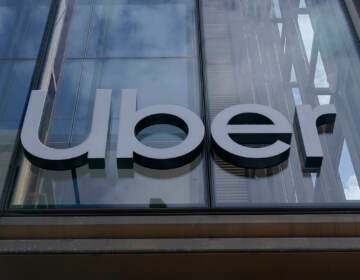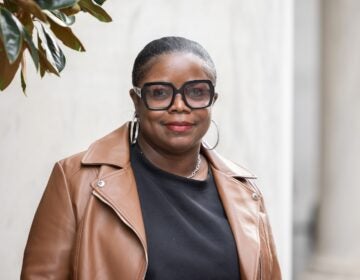Knight grant paves way for ‘ecoventions’ at Schuylkill Center
Three years ago, when an exhaustive 400-page legal document permanently preserved the 340-acre Schuylkill Center for Environment Education property, a single page buried deep in the new rules caught Jenny Laden’s eye.
Laden, the Center’s director of environmental art, runs a program that has existed there since 2001. She noticed that the new government easements for the property’s protection could limit the installation of art projects on much of the Center’s land.
An unexpected inspiration
Some directors might have been frustrated by the new restrictions, but Laden saw an opportunity. The document specified that “ecological art” was still permissible even in the most highly protected areas of the woods – work defined as “art that serves to protect the health of the ecosystem.”
“I read that and I was like, wow, that’s really cool, what’s that about?” Laden said. To better explore the field of artwork that supports the natural landscape, instead of just being installed upon it, Laden successfully pursued a special organizational planning grant from the Pew Foundation.
Now, with a $20,000 matching grant win from the third and final round of the Philadelphia Knight Arts Challenge, as well as a recent grant from the National Endowment for the Arts, two years of research are culminating in the day-long “Beyond the Surface: Environmental Art in Action” conference, debuting at the Center on May 31. And next spring, thanks to the Knight grant, a brand-new artist residency program will address many of the region’s environmental challenges.
An unusual artist residency
With a total budget of $40,000 (once the Center raises the requisite match for its $20,000 Knight award), the new six-month paid residency program will allow four artists to create “ecoventions”: world-premiere installations on the property that are works of art as well as tools for ecological restoration and public education.
Six months might seem like a long time to let an artist explore the property, but Laden says it’s just right for the purposes of the program, made possible by a partnership with the Center for Emerging Visual Artists.
“We can’t expect an artist to show up at the beginning of the month and have a fully-fledged, informed ecological artwork at the end of the month,” she explained. “That’s absurd…the artist needs time to just be here, to learn the site and do research,” and the final product may involve the growth and change of the landscape to come to fruition.
Laden predicts that the Center will release an RFP in late June, open to artists within a 100-mile radius of the Center. A panel of experts will choose the best-suited projects in early 2014, and the selected artists will arrive on-site a year from now.
Inside “Beyond the Surface”
In the meantime, the “Beyond the Surface” conference (whose participating artists have been involved at the Center for the past year) will explore the possibilities of environmental art.
Laden called conference presenters’ work an educational peek at “ecological happenings,” noting that a diverse mix of artists, professors, water engineers, landscape architects and other experts can “come up with innovative ways to solve a problem, but also demonstrate the problem and [its] solution.”
What’s good for nature is also good for ecologically-inspired arts: the conference will be an interdisciplinary forum of science, arts, culture, design and education that Laden said is “the opposite of monoculture.”
Presenting artists include the New York City-based Eve Mosher, environmental activist Lillian Ball, Green Museum executive director Sam Bower, and sculptor Stacy Levy, who designed the Rain Wall & Garden at Springside Chestnut Hill Academy and is currently at work on a Schuylkill Center project to address stormwater runoff at the property’s main building, educating visitors about eco-friendly water management.
Art plays a part
“I was on this kick of having the art actually help with the restoration,” Laden said of the eco-art underway at the Center. “The management of our property is a massive undertaking – why not have the art actually do part of the work?”
Instead of simply sitting in woodsy locale or having an eco-friendly theme, “the art’s actually intervening in the landscape to help its health.”
“Beyond the Surface: Environmental Art in Action” will take place at the Schuylkill Center on Friday, May 31 from 9 a.m. to 4:45 p.m., with a special outdoor reception to follow. Registration for the day-long conference is $80, with discounts available for students and members.
Disclosure: WHYY receives funding from the John S. and James L. Knight Foundation.
WHYY is your source for fact-based, in-depth journalism and information. As a nonprofit organization, we rely on financial support from readers like you. Please give today.




